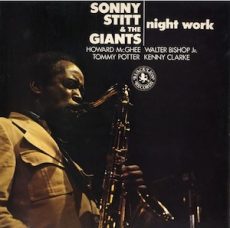
Requisites
Night Work ~ Sonny Stitt And The Giants | By Eddie Carter
As a teenager growing up in the late sixties and early seventies, I was exposed to and enjoyed many different jazz saxophonists, thanks to my Mom and my uncles Ben, Bob, Emmanuel, and Mr. Leo Mintz. Sonny Stitt has always been one of my favorites. He enters this morning’s spotlight with Night Work (Black Lion Records BLP 30154) by Sonny Stitt and The Giants. It was initially recorded in 1967 but not released until 1974. Sonny Stitt is featured on alto sax (A1, A2, B1, B4), and the other giants are Howard McGhee (tracks: A1, A2, B3, B4) on trumpet, Walter Bishop Jr. on piano, Tommy Potter on bass, and Kenny Clarke on drums. My copy is the U.S. Stereo release (Black Lion BL-307).
The opener, Night Work by Howard McGhee, is an upbeat invitation to sit back, relax and ride the rhythm of the ensemble’s swift melody into Sonny’s opening solo. Howard has the next spot and delivers the goods with considerable agility, followed by Walter’s impeccably delivered reading. Howard and Sonny join forces to exchange a few ideas together before Kenny joins their conversation, leading to the reprise and ending. Matter Horns by the team of Eiger and Jungfrau slows the pace to mid-tempo for Stitt’s easygoing theme and relaxing opening statement. Howard comes in next with a pleasantly flowing solo. Walter continues the bluesy groove in the third reading. Tommy and Kenny add a great deal of pleasure to the next two interpretations ahead of the quintet, trading a few riffs together before the climax.
The second side starts with a gorgeous quartet rendition of Loverman by Jimmy Davis, Roger Ramirez, and Jimmy Sherman. It is a beautiful jazz standard that Sonny and the rhythm section begin with their exquisite melody. Sonny captures the standard’s delicacy and tenderness in the song’s lone interpretation preceding the foursome’s elegant conclusion. Both horns take a break for the rhythm section’s lovely version of Satin Doll by Duke Ellington, Billy Strayhorn, and Johnny Mercer. Walter shows a great deal of respect to Duke as he leads the trio through the introduction and melody. He continues making a personal impression on the song’s solo while Tommy and Kenny provide the support ahead of the theme’s restatement and close.
Howard steps into the spotlight with the rhythm section for Don’t Blame Me by Jimmy McHugh and Dorothy Fields. The trumpeter’s piercing tone penetrates the introduction before settling down for a pretty melody. Howard has an exceptionally fine spot as the song’s only soloist, complemented by the trio’s accompaniment culminating in a tender finale. Hello by Howard McGhee brings the album to a close and this song will remind listeners of Milt Jackson’s Bags’ Groove. McGhee’s muted trumpet shares the duties with Stitt during the melody. McGhee steps up first with an excellent muted solo. Bishop gets something cooking in the second statement, and then Stitt takes the spotlight next. Clarke gets the last word in an exchange with both horns ahead of the theme’s reprise and ending.
Alan Bates produced Night Work, and Helmuth Kolbe was behind the dials of the recording. The album’s sound quality is quite good with a solid soundstage that transports the listener to the studio as the musicians are playing. Sonny Stitt was one of the best jazz saxophonists, with a career lasting nearly four decades and a recorded discography of over one hundred albums. He was also proficient on the tenor sax and baritone sax. This is one of his best records, in my opinion, and if you are in the mood for a great sax album, I invite you to check out Night Work by Sonny Stitt and The Giants on your next record-shopping trip. If you’re looking to start a collection of his music, it’s worth seeking out for your library and a title I’m sure you’ll enjoy!
~ Don’t Blame Me, Loverman, Satin Doll – Source: JazzStandards.com © 2024 by Edward Thomas Carter
More Posts: choice,classic,collectible,collector,history,instrumental,jazz,music,saxophone


